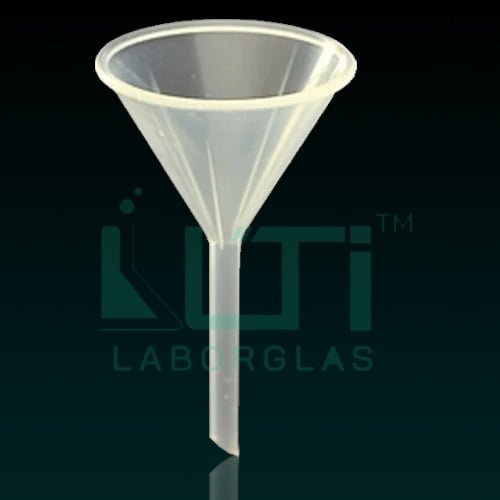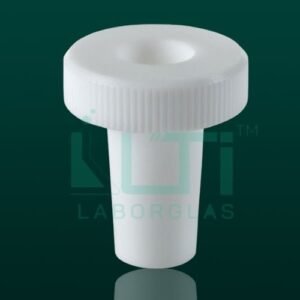- Made of Polypropylene
| PART No. | Size (mm) | PACK Qty. |
| 7250-50 | 50mm Inside 50 Stem Length 50 PP | 72 |
| 7250-62 | 62mm Inside 62 Stem Length 67 PP | 36 |
| 7250-75 | 75mm Inside 75 Stem Length 77 PP | 36 |
| 7250-100 | 100mm Inside 100 Stem Length 95 PP | 36 |
| 7250-35 | 35mm Inside 35 Stem Length 37 PP | 80 |
Here are some common uses of analytical funnels made of polypropylene:
- Sample Transfers:
- Analytical funnels are often used for transferring liquid samples from one container to another. Their chemical resistance ensures that the funnel material does not react with or contaminate the samples.
- Separation of Phases:
- In liquid-liquid extraction or phase separation processes, analytical funnels are employed to separate immiscible liquid phases. This is commonly done in organic chemistry or sample preparation for analytical techniques.
- Filtering and Filtration:
- Analytical funnels can be used in filtration processes where a liquid needs to be separated from solid particles. Depending on the application, a filter paper or membrane may be placed in the funnel for efficient separation.
- Chemical Additions:
- These funnels are useful for controlled additions of reagents or chemicals to reaction vessels. Their design allows for precise pouring, which is important in analytical chemistry and various laboratory procedures.
- Microscale Experiments:
- In microscale chemistry experiments or when handling small quantities of liquids, analytical funnels made of polypropylene provide a convenient and chemically resistant option.
- Powder Funneling:
- Analytical funnels can be used to transfer or funnel powders into containers, ensuring controlled and accurate dispensing of solid substances.
- Sample Loading:
- In sample preparation for analytical techniques such as chromatography or spectroscopy, analytical funnels are used to load samples onto columns or instruments.
- Chemical Compatibility Testing:
- Polypropylene analytical funnels are often used when testing the compatibility of certain chemicals or reagents. Their resistance to a wide range of chemicals makes them suitable for such applications.
- General Laboratory Use:
- Analytical funnels find use in a variety of routine laboratory tasks, such as decanting, transferring, and handling small volumes of liquids.
- Educational Laboratories:
- These funnels are commonly used in educational laboratories to teach students basic laboratory techniques and procedures.







